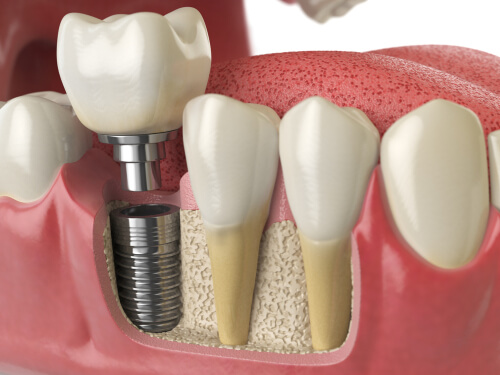
Are Dental Implants Safe?
Expect little discomfort during the procedure and mild soreness after the implant has been placed. This is what many patients report about the dental implant procedure. When it comes to safety, it’s a proven procedure with rare chances of failing.
Are dental implants safe?
Perhaps right now you consider whether to go for dental implants or not. It’s a huge decision that will affect your overall quality of life for the next years to come. Even if there are still restrictions about certain dental procedures (restrictions are continuously being updated depending on the level of threat and new findings), it’s good right now to learn about implants and the potential advantages, risks and disadvantages.
As with many medical procedures, there’s still a chance of failure (up to 10 per cent of implants might fail). The failure or success rate may heavily depend on pre-existing factors such as gum disease, smoking (due to restriction of blood flow to the gums), not enough jawbone to support the implant and medical conditions such as diabetes (this makes your body and the tissues slower to heal). Note though that even with those conditions, many implant procedures still get successful (enquire us if right now you consider having an implant and if it’s allowed now).
What about long-term success and will the implant stand the test of time? One thing to remember is that the implant replaced the functions of a natural tooth. This means the implant is now exposed to the same environment that a natural tooth endures 24/7. This also means that the implants now require the same care as the real teeth. Brushing, flossing and antibacterial mouthwash rinsing are still essential in taking care of your teeth (whether implant or natural). It’s also essential to undergo dental check-ups to spot problems early on and prevent costly consequences and procedures. Professional dental cleaning is also still a must to slow down decay and help make implants last for a lifetime.
What happens before, during and after the procedure?
To set up clear expectations about implants and the required procedure, it’s good to have an idea of what might happen. Before the procedure, it will require a thorough examination and careful planning. For example, there might be issues (e.g. the need for a sinus lift) that could interfere with the implant. These issues should be addressed first before going forward with the surgery.
During the procedure, it can be a bit discomforting and may require the use of a local anaesthesia. The pain and discomfort could be more manageable than the experience of undergoing a tooth extraction. After the procedure, follow-up dental visits will be needed to watch out for potential infections and confirm the stability of the implant (ensure integration of the jawbone with the implant). It’s also important to watch out for allergic reactions against the titanium alloy commonly used in dental implants.
It’s strongly recommended to directly ask a dentist about your concerns regarding dental implants. This way, you’ll immediately know if it’s right for you and you’ll instantly know both the advantages and disadvantages. Also, useful and competent advice requires a thorough examination first so that the advice will be perfectly suitable to the patient. It’s crucial to have an initial consultation and thorough assessment first before accepting the advice and moving forward with a procedure.
